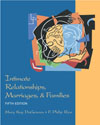Mary K. DeGenova
Philip F. Rice
| bargaining | The process by which two parties decide what each shall give and receive in arriving at a decision.
|
 |
 |
 |
| body language | Posture, facial expression, still or tense muscles, blushing, panting, tears, sweating, shivering, increased pulse rate, a thumping heart, and other bodily reactions that convey feelings and reactions.
|
 |
 |
 |
| coercive power | The threat of physical force or other type of punishment to force compliance.
|
 |
 |
 |
| communication | A message one person sends and another receives.
|
 |
 |
 |
| double-bind communication | Conflicting messages sent when verbal messages and body language don't agree.
|
 |
 |
 |
| expert power | Power that is given because a person is considered superior in knowledge of a particular subject.
|
 |
 |
 |
| feedback | Response to the message another has sent and disclosure of one's own feelings and ideas.
|
 |
 |
 |
| gaslighting | The process by which one person destroys the self-confidence, perception, and sense of reality of another person.
|
 |
 |
 |
| implementation power | Power that sets decisions in motion.
|
 |
 |
 |
| informational power | Power acquired because of extensive knowledge of a specific area.
|
 |
 |
 |
| legitimate power | Power that is bestowed by society on men and women as their right according to social prescription.
|
 |
 |
 |
| orchestration power | Power to make the important decisions that determine family life-style.
|
 |
 |
 |
| power | The ability of an individual within a social relationship to carry out his or her will, even in the face of resistance by others.
|
 |
 |
 |
| power processes | The ways in which power is applied.
|
 |
 |
 |
| scapegoating | Blaming someone else for every bad thing that happens.
|
 |
 |
 |
| theory of primary interest and presumed competence | The theory that the person who is most interested in, most involved with, and best qualified to make a particular choice will be more likely to do so.
|



 2002 McGraw-Hill Higher Education
2002 McGraw-Hill Higher Education